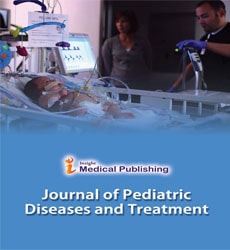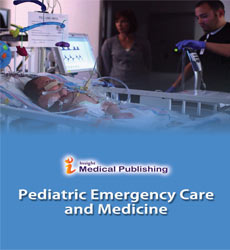Use of Arginine Vasopressin in Single Ventricle Patients
Meghu Lokesh
DOI10.36648/ippecm.21.6.19
Meghu Lokesh
Department of Pharmacy, Jawaharlal Nehru Technological University, Hyderabad, Telangana, India
*Corresponding author: Meghu Lokesh, Meghu.L015@gmail.com Department of Pharmacy, Jawaharlal Nehru Technological University, Hyderabad, Telangana, India.
Citation: Lokesh M (2021) Use of Arginine Vasopressin in Single Ventricle Patients. Pediatr Emerg Care Med Open Access. Vol.6 No.4:19.
Received: July 20, 2021; Accepted: July 25, 2021; Published: July 30, 2021
Even in the absence of robust investigational data to support the routine use of AVP in pediatric patients after cardiac surgery, this response demonstrate that AVP use is relatively widespread in the postoperative management of patients with single ventricle congenital heart disease. It also suggests higher general interest and ubiquity of use than was previously described. Major highlights of this study relate to the fact that approximately half of the surveyed practitioners use AVP to manage the first-stage palliation for single ventricle patients, albeit many consider AVP as a second-line drug. Notwithstanding that fact, the vast majority (90%) of these clinical providers also use AVP in subsequent interventions, which may reflect a higher level of trust in the drug in patients beyond the neonatal period. Of significant importance, we documented that protocols are scarcely used in relation to AVP, which opens avenues toward implementing more consistent practices within the medical community in charge of the postoperative course of single ventricle patients. It is clear that most indications to use AVP in the postoperative period of single ventricle interventions relate to the optimization of tissue perfusion and end-organ function and to antagonize excessive systemic vasodilation secondary to the postoperative inflammatory status allied with side-effects of other cardiovascular drugs. By no means does this survey provide evidence-based data, nor should it influence clinical practices. However, it may spawn clinical studies designed to explore the impacts of AVP on patient outcomes. Nonetheless, a study of this nature may foster further collaboration to implement consistent algorithms for AVP use, gather data collectively, and hopefully better understand the characteristics of this drug and its relation with outcomes in this very complex patient population. The executives of patients with single ventricle physiology after careful concealment are testing. Arginine vasopressin has acquired fame lately as a non-catecholamine vasoactive prescription because of its special properties. Notwithstanding, information with respect to its utilization in the pediatric populace is restricted. Subsequently, we planned an overview to investigate whether and how clinicians utilize this drug in concentrated consideration units for the postoperative administration of single ventricle patients. This global study expected to evaluate utilization, practices, and ideas identified with arginine vasopressin in pediatric escalated care units around the world. Heads of pediatric concentrated consideration units who are individuals from the accompanying worldwide expert social orders: European Society of Pediatric Neonatal Intensive Care, Association for European Pediatric and Congenital Cardiology, and Pediatric Cardiac Intensive Care Society were welcome to partake in this study. Of the 62 emergency units who reacted, almost half use arginine vasopressin in the postoperative administration of neonatal single ventricle patients, and 90% additionally utilize the medication in ensuing careful vindication. The essential signs are vasoplegia, hemodynamic flimsiness, and hard-headed shock, despite the fact that it is as yet viewed as a second-line prescription. Applied advantages incorporate further developed hemodynamics and end-organ perfusion and diminished rate of low heart yield disorder. Those specialists who don't utilize arginine vasopressin refer to absence of accessibility, dread of likely unfavorable impacts, muddled sign for use, and absence of proof proposing further developed results. The two clients and non-clients depicted expanded myocardial afterload and outrageous vasoconstriction as possible disservices of the medicine. Notwithstanding the absence of convincing information showing upgraded clinical results, our investigation discovered arginine vasopressin is utilized broadly under the watchful eye of babies and youngsters with single ventricle physiology after the main stage and ensuing palliative medical procedures. While numerous concentrated consideration units utilize this drug, not many had conventions, offering a region for additional development and advancement.

Open Access Journals
- Aquaculture & Veterinary Science
- Chemistry & Chemical Sciences
- Clinical Sciences
- Engineering
- General Science
- Genetics & Molecular Biology
- Health Care & Nursing
- Immunology & Microbiology
- Materials Science
- Mathematics & Physics
- Medical Sciences
- Neurology & Psychiatry
- Oncology & Cancer Science
- Pharmaceutical Sciences
